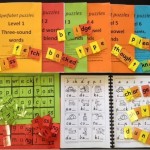It’s not a spelling test, it’s a quiz
3 Replies
Spelling tests are boring, right? The teacher reads out a word, everyone writes it down, then it gets marked. Ho hum. Nobody really likes them except annoying pedants and teacher’s pets.
Quizzes, on the other hand, are fun. They have quizzes on TV and in pubs, board games and apps. Quizzes are about thinking laterally, friendly competition, and having a bit of a laugh. They can even be done in teams, if collaborative learning is the main aim. You can ham it up with a top hat and some pictures of typical quiz prizes (you win the steak knives!).
Here’s an example beginner’s quiz for a six-year-old. She is working on three-sound words with “short” vowels, and starting to learn about consonant digraphs like sh, ch and th. She was keen to write on a whiteboard rather than use pencil and paper, but whiteboards aren’t necessary. My questions were something like:
- I’m like a really big car that lots of people can fit in, and I drive on the road, and stop to pick people up, and I start with the sound “b” and I rhyme with “fuss”.
- The opposite of the bottom is the “t…”
- I am an animal that says “woof, woof” and I like to go for walks, and when I was a baby I was called a puppy.
- When I need to buy something, I go to a “sh…”
- I am a thing you can wear on your head to keep the sun off or keep your head warm, and I start with “h” and I rhyme with “cat”.

The other contestant in this quiz, her mum, obligingly got a couple of words wrong, allowing her delighted daughter to mark her down, win the quiz, and then magnanimously write “good try” on her mum’s whiteboard (I gave her moveable alphabet spellings and helped her assemble these words before copying them) before handing the board back. Because parents need encouragement too.
Quizzes can work at any spelling level. Imagine you’ve been working on the grapheme “ssi”, and thus want your student(s) to spell the following dozen words: mission, passion, discussion, expression, impression, profession, permission, possession, admission, depression, aggression, compassion.
Tell your quiz entrants that all words contain the spelling “ssi” for the sound “sh”, and/or that they end with “ssion”. Questions could then be:
- An important quest, usually involving travel overseas or into outer space. Starts with “m”.
- Strong and barely controllable emotion. Starts with “p”.
- A conversation or debate about a specific topic. Starts with “d”.
- Sharing one’s thoughts or showing one’s feelings to others. Starts with “e”.
- An idea, feeling, or opinion about someone, especially an initial one that isn’t based on much thought or evidence. Starts with “i”.
- A paid occupation, especially one that requires a university education. Starts with “p”.
- Consent or authorisation. Starts with “p”.
- The state of having, owning, or controlling something. Starts with “p”.
- Acknowledgement of the truth of something. Starts with “a”.
- Feelings of severe sadness and dejection. Starts with “d”.
- Readiness to attack or confront. Starts with “a”.
- Concern for the suffering or misfortune of others, starting with “c”.
Definitions from the dictionary can be used as quiz clues, if need be. If you keep an online dictionary like this one open on your phone or tablet, definitions can even be looked up as you go, leaving only target words to be chosen beforehand. My free spelling lists might help with this.
If quiz participants have quite different ages/skill levels, a handicap system could be used to give everyone a fighting chance of winning e.g. younger participants receive three points per correct answer, slightly older ones get two points and adults get only one point.
Do your students prefer a “spelling quiz” to a “spelling test”?



Whatever the format of the prompt…do you not count unnecessary use of uppercase letters as a spelling error? (Bus for bus)
We find that students with letter-image difficulties often use upper and lowercase letters somewhat randomly. If you look closer, their inappropriate use of uppercase letters in most observed with confusable letters like Bb and Dd. We have found it effective to count letter case a spelling element. Kids get points for correct spelling and –in sentence dictation–for correct capitalization of the first word in the sentence and use of punctuation at the end of the sentence.
Spelling needs to bridge to sentence writing.
Hi Sandy, I should think about this more, I think. I mostly work at word level and just insist on upper case for names etc, and when kids put an uppercase letter in the middle of a word I say “that’s the right letter but we don’t usually put capitals in word middles” and then rub it out and ask them to redo it. But I am now trying to do more sentence-level work and I agree it does matter more then. So points for correct case make good sense.
I agree. I insist on all lower case for a spelling test/ quiz. It’s a list not a sentence & gives another opportunity to reinforce lower case for those over learned Bs and Ds especially if the uppercase letters are restricted to those letters they have habituated and not on every word in the list.